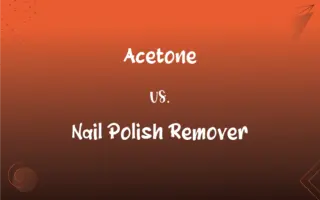Molten Electrolysis vs. Aqueous Electrolysis: What's the Difference?
Edited by Aimie Carlson || By Janet White || Published on February 10, 2024
Molten Electrolysis is an electrochemical process in a molten state. Aqueous Electrolysis is electrolysis in a water-based solution.

Key Differences
Molten electrolysis involves the electrochemical decomposition of a molten ionic compound to produce elements. Aqueous electrolysis, in contrast, is the electrolysis of substances dissolved in water, involving water's participation in the reaction.
In molten electrolysis, only ions from the molten compound participate in the reaction, leading to a straightforward production of elements. Aqueous electrolysis involves not only the ions from the dissolved substances but also the ions from water, adding complexity to the reaction.
Molten electrolysis requires high temperatures to melt the ionic compound, typically used for substances with high melting points. Aqueous electrolysis occurs at relatively lower temperatures as it involves solutions in water.
An example of molten electrolysis is the extraction of aluminum from bauxite. Aqueous electrolysis includes the electrolysis of saltwater to produce chlorine gas and sodium hydroxide.
Molten electrolysis is energy-intensive due to the high temperatures needed. Aqueous electrolysis is less energy-intensive but involves competition between water molecules and solute ions for the reaction.
ADVERTISEMENT
Comparison Chart
State of Electrolyte
Molten (high temperature)
Aqueous (water-based solution)
Reaction Participants
Only ions from the molten compound
Ions from both dissolved substance and water
Temperature Requirement
High, for melting the compound
Relatively lower, as it involves water
Typical Applications
Extraction of metals like aluminum
Production of substances like chlorine and NaOH
Energy Intensity
High due to temperature requirement
Lower compared to molten electrolysis
ADVERTISEMENT
Molten Electrolysis and Aqueous Electrolysis Definitions
Molten Electrolysis
Molten electrolysis requires high temperatures to melt the compound.
The high temperature in molten electrolysis helps in melting the ionic salts.
Aqueous Electrolysis
Aqueous electrolysis involves electrolyzing substances dissolved in water.
Hydrogen gas can be produced by aqueous electrolysis of water.
Molten Electrolysis
In molten electrolysis, the electrolyte is a melted ionic compound.
Sodium metal is obtained through molten electrolysis of sodium chloride.
Aqueous Electrolysis
Aqueous electrolysis is conducted at relatively low temperatures.
The electrolysis of saltwater is an example of aqueous electrolysis.
Molten Electrolysis
Molten electrolysis produces elements directly from their ionic compounds.
Molten electrolysis of calcium chloride yields calcium metal.
Aqueous Electrolysis
This method often produces a mixture of products due to water's involvement.
Aqueous electrolysis can lead to the production of multiple substances, including gases.
Molten Electrolysis
This process is energy-intensive due to the heat needed to melt the electrolyte.
The energy consumption in molten electrolysis is significant because of the high temperatures involved.
Aqueous Electrolysis
In aqueous electrolysis, water participates in the reaction.
Aqueous electrolysis of copper sulfate solution involves water molecules.
Molten Electrolysis
Molten electrolysis is the process of decomposing a molten ionic compound using electricity.
Molten electrolysis is used to extract pure aluminum from its oxide.
Aqueous Electrolysis
Aqueous electrolysis is used for producing chemicals like chlorine and sodium hydroxide.
The chloralkali process is an industrial application of aqueous electrolysis.
FAQs
What is molten electrolysis primarily used for?
It's mainly used for extracting metals from their ores.
Why is molten electrolysis energy-intensive?
Due to the high temperatures required to melt the ionic compounds.
What does aqueous electrolysis involve?
It involves electrolyzing solutions where water is the solvent.
What makes aqueous electrolysis different in product formation?
The participation of water can lead to a variety of products.
Can molten electrolysis occur at room temperature?
No, it requires high temperatures to melt the electrolyte.
What are common applications of aqueous electrolysis?
Producing chemicals like chlorine and hydrogen gas.
Does water participate in molten electrolysis?
No, water does not participate in molten electrolysis.
Why is molten electrolysis not suitable for all metals?
Due to the varying melting points of different ionic compounds.
What are safety considerations for molten electrolysis?
Handling high temperatures and reactive molten materials safely.
What are the products of aqueous electrolysis of water?
Hydrogen and oxygen gases.
Are special containers needed for molten electrolysis?
Yes, containers must withstand high temperatures.
Can aqueous electrolysis be performed at home?
Yes, with proper safety measures and simple apparatus.
Can any ionic compound be used in aqueous electrolysis?
Most ionic compounds soluble in water can be used.
What is the main challenge in molten electrolysis?
Maintaining consistent high temperatures.
How does temperature affect aqueous electrolysis?
Higher temperatures can increase reaction rates.
Is molten electrolysis a green process?
It can be energy-intensive, impacting its environmental friendliness.
Is molten electrolysis used in the aluminum industry?
Yes, it's used for extracting aluminum from bauxite.
Is aqueous electrolysis used for water purification?
It can be used, but it's primarily for producing gases and chemicals.
Can molten electrolysis be used for non-metal extraction?
It's primarily used for metals; non-metals require different processes.
What factors influence the efficiency of aqueous electrolysis?
Electrolyte concentration, temperature, and electrode material.
About Author
Written by
Janet WhiteJanet White has been an esteemed writer and blogger for Difference Wiki. Holding a Master's degree in Science and Medical Journalism from the prestigious Boston University, she has consistently demonstrated her expertise and passion for her field. When she's not immersed in her work, Janet relishes her time exercising, delving into a good book, and cherishing moments with friends and family.
Edited by
Aimie CarlsonAimie Carlson, holding a master's degree in English literature, is a fervent English language enthusiast. She lends her writing talents to Difference Wiki, a prominent website that specializes in comparisons, offering readers insightful analyses that both captivate and inform.






































































